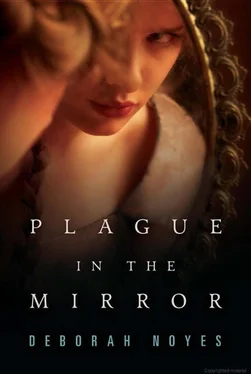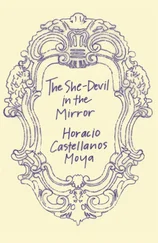On her knees, May works the zipper closed and rests her head on the overstuffed pack, yawning. She swivels and rolls flat on the floor, the intricate mosaic tiles cooling her back.
“You didn’t sleep,” Li acknowledges, “did you?”
May covers her eyes with a forearm. “Guilty.”
He heaves himself off the bed and lifts her backpack, gently prodding her with his foot. As he slings the pack onto his shoulder, May props herself up on an elbow. In the silence, she’s tempted to tell Li what really happened last night, or what she thinks happened, because unlike her parents or Gwen, he would at least entertain that something weird occurred (and May still can’t convince herself it didn’t). He’d joke it to death, sure, and rob it of every hint of strangeness and mystery; he’d make her feel silly, but he’d make her feel safe.
All her life she’s felt safe — more or less sure of herself and her place in the world — and now the people who gave her that are back in Vermont, dismantling home, stripping certainty away.
The idea that May’s freak twin might be more than a dream is a lot like the fact that her parents are splitting up and forcing her to choose between them. It fits no known pattern of security.
Li’s still waiting with her heavy pack on and a hand gripping the handle of her suitcase, so she offers one of her own hands like a hook, and he hauls her up.
Gwen’s rented a small, airy third-floor apartment in City Center East. They cab over and settle in, opening doors and drawers, calling dibs on rooms, napping awhile. Later they devour the biscotti and mandarin soda from their landlord’s care basket, enjoying the river view from the terrace. The sunlight has turned everything gold, and the temperature has dipped to bearable, so Gwen leads them outdoors and north toward the historic heart of the city a half dozen crowded blocks away.
Crossing to Piazza della Signoria is like parting the Red Sea. There are people everywhere, streaming in the same direction or trying to chisel a path in the opposite one. The narrow, shaded streets echo with the bleating toy horns of Fiats and the wasping drone of mopeds.
As they enter the piazza, May sees dozens, possibly hundreds, of people milling around in bright summer outfits. They chatter and squint up at carvings tucked in niches, pursue restless children pursuing pigeons, back into one another while framing photographs, and line up at carts to buy trinkets and limonata. High above them all, the sun-gilded tower of Palazzo Vecchio casts its long, welcome shadow over parched piazza stones.
As soon as she spots it, Gwen makes a beeline for Michelangelo’s David, lingering until Liam and May jar themselves out of whatever sensory stupor they’re in and sidle up beside her. She explains at length that it’s only a copy; the real statue was moved indoors to the Accademia long ago, and May dutifully takes in David’s furrowed brow and blank eyes. But she can’t help it; her gaze slips down the famous torso to the statue’s nether regions. She clears her throat and turns to Li, who’s pursing his lips with a considering nod. They shrug at exactly the same moment and steer Gwen away, marching her past the surging horses in the Fountain of Neptune in search of gelato.
The fountain’s spray cools May’s cheek as they pass, and she tries not to let the flags swaying high in a still-hot breeze or the writhing bodies and muscled lions and screaming women on tall marble pedestals in the loggia unnerve her. Instead, she focuses on the crop of art students sketching side by side on the stone base of a nearby building: heavy-lidded boys; fashionable girls; a middle-aged woman in a plaid beret. They seem so content there, alone but together.
May follows a few more blocks north, lingering on the street while Gwen and Liam duck into a narrow gelato shop. They find her sitting on unoccupied steps within view of the cathedral and hand hers over — chocolate, always — and after they all dig in, Gwen points out Giotto’s campanile and Brunelleschi’s dome, il Duomo, in the distance.
“The last time I was in Florence,” she tells them, “a friend brought me to a department store somewhere near here. Rinascente, I think. There’s a rooftop café there I’ll take you to. Seeing all this from on high is amazing, but you know that already. I think we’ll be right at home in the apartment, don’t you? We lucked out with our views.”
May and Liam nod vigorously but go right on excavating with their little shovel-shaped plastic spoons, eyes downcast, devoted. They’ll develop a pretty successful work pattern in the days to come. The two of them will take in another mosaic or waxwork or painting of the Virgin and Child; Gwen will buy them ice cream.
“You learn so much about a place through its art,” she’s rhapsodizing between dainty bites of lavender-fig gelato as they stand as one and start to walk north again. Looking at May, she asks, “Did you know your mother was studying art history when we met at school?”
Mom likes to paint — every few years she drags out her easel and invests in fresh tubes of acrylic — but May had no idea she studied art formally. Her urbane mother would appreciate it here — all these frescoes and gap-eyed statues, all these people bustling around in nice shoes — way more than May does.
And suddenly she feels overwhelmed by it all, not least the exquisite bulk of the domed cathedral they’re now approaching. With its dizzying stripes and bold arches, its geometric intricacy of white-and-pink-and-green marble, the structure Gwen identifies as the Basilica di Santa Maria del Fiore seems to take up several city blocks. They sit down on another set of stone steps to take in the view.
May has never seen anything like it.
The only stillness on these swarming streets, it seems, is the architecture: stone and stucco and salmon tiles, shuttered windows and ancient, crowding towers. Even the sun is moving, May knows, casting longer and longer shadows, marking time. She feels ashamed of her own indifference, of how little she deserves this.
When May doesn’t comment, Gwen stands up with a glance at Liam. “I’m off in search of a cup of coffee. Meet you back here in twenty?”
May nods up at her, heartsick somehow. The strangeness of her surroundings has taken hold, and with it a sadness she wasn’t ready for. Because it’s over now: the mindless quiet of a Vermont morning; waking to the smell of Dad’s coffee and a fuzz of green in the window, to Mom’s old radio playing softly in her home office, barely audible under the mounting chorus of the birds; all that ease and sweetness. “What are we doing here?” she asks aloud.
“Here on these steps?” asks Liam. “In Florence? On Earth? Can you be more specific?”
“Gwen never should have let you take that philosophy class,” May complains, with a knuckle-punch to his forearm. She doesn’t want to be lousy company. Not here. But before she can explain herself, the ghost girl from the B&B intrudes into her thoughts again.
“You know why we’re here,” Li says lazily. “To help Mom with her book.”
May’s gaze lights on a glowing figure in the shade at the edge of the cathedral, which turns out to be a little girl in a gauzy sundress, blowing bubbles with a wand. “Remind me?”
“Historical travel guide for eggheads… like the one she did about London? You know, what composer’s buried in what tomb in what cemetery, and where do all the bohemians drink their coffee, and where were all the queens beheaded. You get the idea.”
Gwen teaches medieval literature to grad students and publishes seriously wonky papers in her area of expertise, May knows, but also moonlights as a popular travel writer.
“My tuition’s coming due, so she signed on for two more guidebooks in that series. You heard it here: it’s all tombs and dungeons from now on…. Evidently everyone thought this would really cheer you up.” When she doesn’t respond, he adds, “Did you think you were here to soak up the Tuscan sun and eat ice cream?”
Читать дальше












